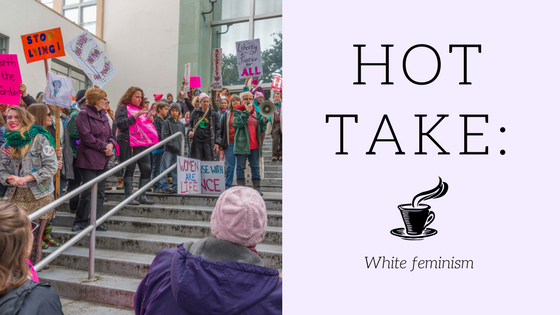White feminism not as progressive as it appears

Photo via Flickr (Bob Dass) under Creative Commons license
Women rest after participating in the Women’s March in California. By solely focusing on the problems faced by white women and disregarding those women belonging to minority groups deal with, white feminists fail to promote equality for every woman.
Here’s a hot take: mainstream white feminism disregards the complications faced by women belonging to marginalized groups.
Since the emergence of feminist movements in the nineteenth century, countless women have made significant efforts toward obtaining the same social and economic opportunities as their male counterparts.
More than one century after its debut, the practice of feminism has only grown in popularity, as seen in the various movements that have taken place in the previous year. Whether one chooses to examine the lasting power of the Women’s March or the impact of the #MeToo campaign on discussions pertaining to sexual assault, the growing influence of feminist principles in today’s society cannot be denied.
While taking a stand against the prejudice faced by women has proven to be beneficial, it has also contributed to the rise of white feminism, a brand of feminism that acknowledges the issues faced by white women while ignoring the ones dealt with by women who are racial, ethnic, religious, and sexual minorities.
Examples of white feminism can be detected in the words and actions of numerous celebrities who are self-proclaimed feminists. It can be seen in actress and author Rose McGowan’s aggression when confronted about her lack of activism for transgender women and erasure of black women’s experiences with sexual assault via Twitter. Actress Lena Dunham is also guilty of contradicting her alleged feminist values, as revealed by her dismissal of actress Aurora Perrineau’s allegation of sexual assault.
Because white feminism has especially become popular among influential figures in media, it can be difficult to perceive it as less than desirable. Individuals who call out white feminists for the lack of inclusivity in their activism are oftentimes called misogynists for reasons that seem acceptable from an outsider’s perspective.
In a society where women are encouraged to unapologetically blaze their own trail toward success, pointing out flaws in another woman’s activism is viewed as a sexist act. However, it is worth doing so when considering the complications faced by minority women that continue to be overlooked.
White feminists fail to tackle problems beyond the realm of gender. Many of them re-emphasize the reality of the gender wage gap but fail to acknowledge the lower pay ethnic and racial minorities receive. For every 82 cents earned by a white woman to a white man’s dollar, black and Hispanic women earn 65 and 58 cents to that dollar, respectively.
Even outside of the workplace, women belonging in marginalized groups continue to experience discrimination in various forms. According to the United States Bureau of Justice Statistics, approximately three-quarters of sex trafficking victims are women of color, and roughly 25 percent of Hispanic women, 29 percent of black women, and 32 percent of Native American women live in poverty. Additionally, the average life expectancy of a trans woman of color is 35 years old.
Despite the reality of these issues, today’s white feminists have chosen to ignore them. By promoting the narratives of white women and directing their energy toward creating unproductive movements, white feminists are drawing attention away from issues that affect women on a larger scale.
In other words, white feminism should not be mistaken for feminism. It contradicts the tenets of true feminism, which is intended to uplift every woman regardless of her race, ethnicity, religion, or sexuality.
The importance of being inclusive in one’s activism cannot be overstated. By listening to the concerns of various groups of women and advocating for meaningful change, women from all walks of life can benefit from one another’s activism rather than merely reinforcing white supremacist values.

